IBS 2010: Generac standby generators are smarter than me
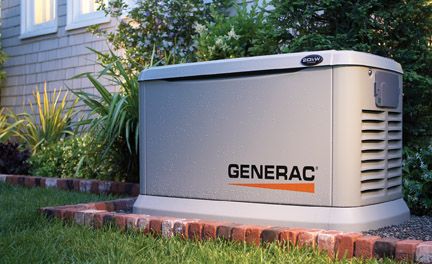
Just before the holidays I had a conversation with Cliff Popejoy who wants to write a story about retrofitting a standby generator for emergency power. My eyes glazed over as Cliff described the process and equipment. There is no doubt that it is an important story and we will publish it as soon as we can, but I have a hard enough time wrapping my head around common wiring tasks. When Ciff introduced foreign objects like transfer switches over the phone, I quickly got lost. It turns out that this stuff is not all that difficult to understand.
Generac manufactures both portable and standby generators. I toured their booth today at IBS today. Because this is a new product category to me, I was impressed by everything I saw, but mostly I was impressed by the simplicity of both installing and maintaining emergency power. All you need is a generator (most of the products I saw today run on natural gas or propane), and a transfer switch (which isn’t much different than a sub-panel).
When you install the system, you can decide which circuits the generator should feed in a power outage. Depending on the generator’s size and the demand of your home, you may be able to feed everything. You can also decide which circuits should be the first to power down if the generator can’t meet the demand. Once the system is operational, you can control and monitor all of its activity through wireless remotes with LCD screens. But what’s to monitor? The only maintenance is an occasional oil and air filter change. In fact, the generators are programmed to run once a week for ten minutes to keep the V-twin engines happy. Yeah, they’re a lot like a Harley engine, only more refined, according to Clement Feng, Generac senior vice president. More refined perhaps, but they still rumble a bit on ignition, which will likely be a comforting sound to homeowners who loose power during the next winter ice storm.
| HEADLINES FROM THE INTERNATIONAL BUILDERS’ SHOW | |
 |
IBS 2010: The Model Home Gets a Reality Check A case study in irony: Construction stops on 6,000-square-foot showcase home dubbed ‘The New American Home’ after falling victim to the credit crunch. Read more… |
 |
IBS 2010: Schluter Introduces new Foam Core Tile Backer System Structural panels will ease the process of making tile partitions, walls, and structures for bathrooms and more. Read more… |
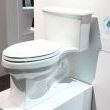 |
IBS 2010: More Bang for Your Flush in Kohler’s 1.28 gallon Toilet With water conservation top of mind Kohler showed off its new 1.28 gallon one-piece toilet at the International Builders’ Show here in Las Vegas. Read more… |
 |
Generac Standby Generator is Smarter than Me A tour of Generac’s booth left me wondering why more homes aren’t equipped with emergency power. Read more… |
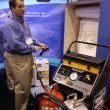 |
IBS 2010: Spray Insulation Rigs for the Rest of Us Looking to get into the spray insulation business but don’t want the huge investment? Here’s a new portable unit you might be interested in. Read more… |
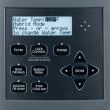 |
IBS 2010: Promising new water heater GE released the first Energy Star rated water heater that uses heat pump technology and smart controls for significant energy saving potential. Read more… |
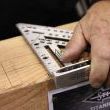 |
IBS 2010: Stiletto to Introduce New Titanium Square and Knife The maker of high-end titanium hammers and prys shows off prototypes of its upcoming speed square and utility knife, due out later this year. Read more… |
 |
IBS 2010: Day One Round Up of New Tools and Products From entry-level spray foam applicators to a rainwater collection system to some smaller gadgets and accessories, here’s what caught our eye at day one of IBS. Listen to the audio slideshow… |
Fine Homebuilding Recommended Products
Fine Homebuilding receives a commission for items purchased through links on this site, including Amazon Associates and other affiliate advertising programs.

Affordable IR Camera

8067 All-Weather Flashing Tape

Reliable Crimp Connectors
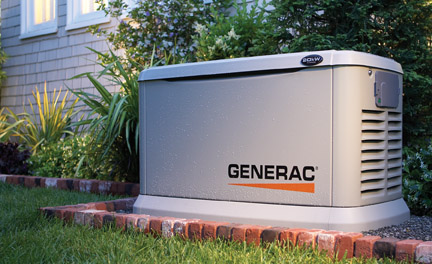
Unobtrusive emergency power. It may be no more of an eyesore than an AC compressor, but I still would have put it behind the bushes.
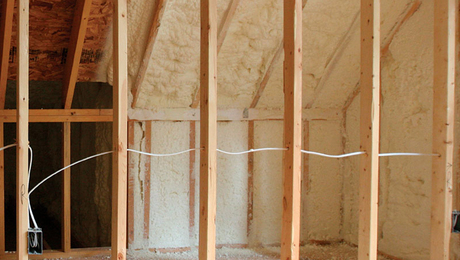


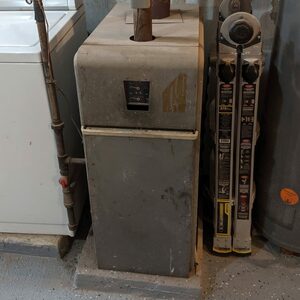

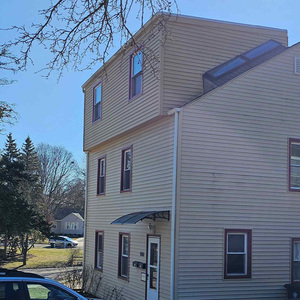

















View Comments
Fine Homebuilding has never been a staged commercail for any brand or maker, and generators are no time to start.
Despite their hi-power sales force, they generators themselves are nothing to be overly proud of. Though, that leads one to ask 'what brand' ... and that's exactly the wrong direction for the discussion to take.
Far. far more important than the generator are the OTHER, associated issues. Let's look at them, in no particular order:
1) How big? The latest version of the NEC has language that will lead you to getting a generator that is WAY to big. Too much generator is a bad thing, having a serious effect on the reliability of the generator;
2) The way the generator ties into the house - the transfer switch- is by far the most critical part of the system;
3) An 'exercise program' -where you run the generator regularly under load - is critical to the reliability of the system;
4) Fuel costs, and the availability of fuel in a crisis, are major considerations. Even a small generator can easily burn $400 of fuel in a month without power;
5) Maintenance and repairs of the equipment are real considerations. Some brands use standard components, readily found at supply houses. Others depend upon expensive and hard to get proprietary components; finally,
6) NOISE is a major consideration. Every generator is outrageously noisy in its' standard configuration, and the optional 'sound packages' are expensive.
Telling me you have an article in the works scares me. IMO, this is a topic best left to a licensed contractor, and is not for even the gifted DIY.
As a side note, in a few years we will see major changes in the way we do cell phones. One of the consequences to this change is that there will be an enormous number of lightly used generators coming on the market.
Having lived through Hurrican Katrina, without power for two weeks, I learned a lot about generators. For most of us they are not a good option for long term outages due to fuel issues. Fuel is difficult to obtain during widespread outages, needs frequent refillings in most cases, and is very expensive. Natural gas is a great option, and one of the least suspectable to outgage, but it can be disrupted as many found out. For short term outages, which are by far the type of outage that we most often encounter, a generator can be great for maintaining the "status quo" until power is restored, but they are not really a good option for most of us during long term outages. Be sure your expectations are realistic if you opt to install one, and be CERTAIN that it is connected via a proper transfer switch. And check the oil level frequently during operation, they are notorious for burning oil.
I live off grid & so use a generator on a regular basis. I have a Kubota diesel engine attached to a Stamford generator (the two are not the same & the word "generator" is unfortunately used to describe both, the engine & the generator/alternator).
I disagree with the Amish Electrician as not ALL generators are noisy. My diesel generator is no more noisy than my vehicle engine, none of the clickety-clack that you associate with diesels. My neighbor's gas engine & the other neighbour's old Lister diesel are both noisy. Honda gasoline driven units typically are not noisy at all. I am also VERY sensitive to noise, one reason that I live off grid in the boonies. Sadly most inexpensive units can be VERY noisy, but they don't have to be. Some units come with decibel levels as part of their specs & this should be considered.
Maintenance & repairs can be good or bad & I'd guess is more linked to quality or price. My Kubota (expensive at the time & good quality rep) has been EXTREMELY reliable over 9 years of use or 4500 hours & so far has only needed oil & filter & fluid changes. It also starts reliably in our Canadian winter, though at -30C it sometimes needs 2 tries.
I can't disagree with his other comments but I would say that they are not as "critical" as he makes them sound to a generator purchase. His last comment about price though is as I've seen, generation units are dropping in price & I'd suggest most folks for occassional use, look at some used units (again not too big, which I agree with) vs. brand new.
I did not opt for a propane or natural gas generator for long term use as these engines like gasoline engines, typically run at higher RPM's & so the engines wear faster than the lower RPM diesel fuel engines. A friend who also lives off grid has replaced or rebuilt his Honda gas driven engine 3 times, or about once every 4 years. So for long term or consistant use, I'd suggest folks consider diesel engine driven generators over any type of gas, but they should also check the noise level of the diesel before buying it, though that is no gaurantee that it will be louder than some gasoline engines. Kubota, Isuzu, Yanmar & perhaps a couple of others are great diesel engine driven units to look at, and Stamford are great "generators" or alternators, which in the end is THE most important part as it produces your power and the quality of that power. Both should be considered seperately.
I have a hard time learning about things like diesel generators because they are just so complicated for my little brain! However, I realize how important they are to society after we had a storm a few years back. This site has helped me a little bit and maybe it will help others: http://www.hipowersystems.com